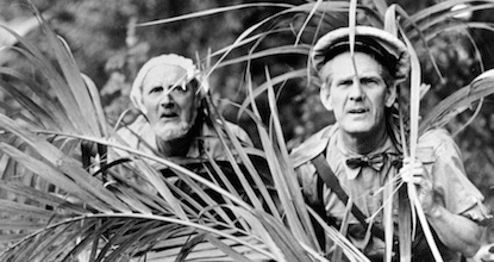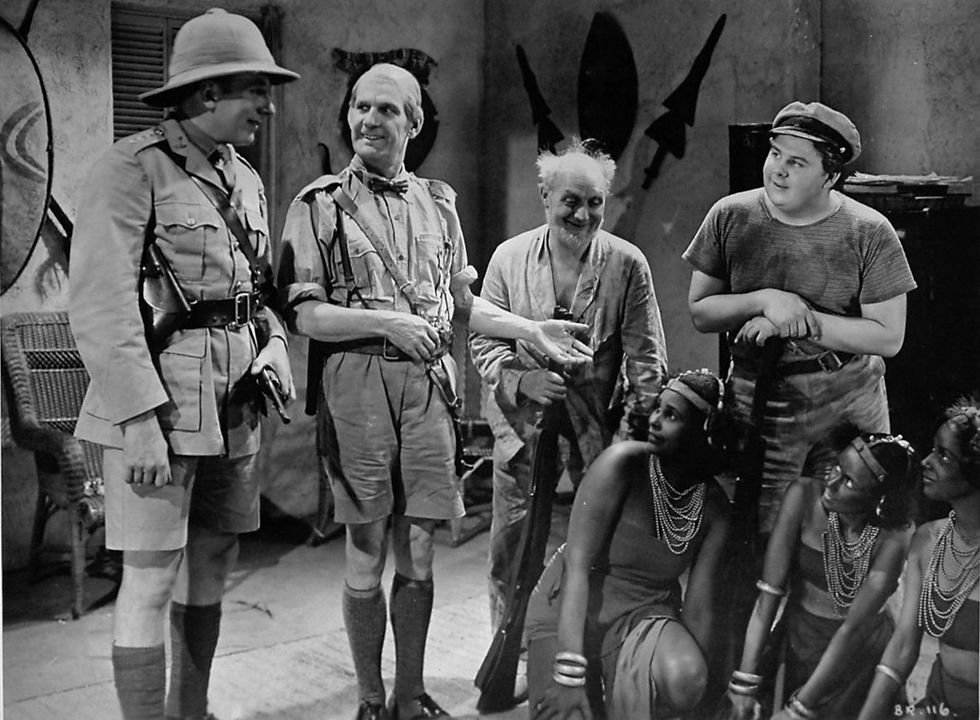Old Bones of the River (1938)
- Soames Inscker

- Apr 21, 2025
- 4 min read
Updated: Jun 7, 2025

Old Bones of the River is a 1938 British comedy directed by Marcel Varnel, starring the legendary Will Hay alongside his frequent collaborators Moore Marriott and Graham Moffatt. This film was one of several successful outings for the trio, known for their chaotic energy, rapid-fire banter, and signature brand of British humour rooted in authority figures turned farcical fools.
Set in a fictional British colony in Africa, the film attempts a satirical look at imperial administration through the lens of a bumbling schoolmaster-turned-colonial officer. Although its themes and humour are a product of its time — and some of its depictions are problematic by today’s standards — the film stands as a curious time capsule of pre-war British comedy, with Hay at the height of his fame.
Plot Summary

Will Hay plays Professor Benjamin Tibbets, a hapless schoolmaster who signs up with the Colonial Education Service and is shipped off to British West Africa. His mission: to bring British education and values to the native population. What follows is a series of misadventures as Tibbets, completely unprepared for colonial life, causes diplomatic blunders, provokes tribal uprisings, and bumbles his way into leadership roles he has no business holding.
Accompanying him are Jeremiah Harbottle (Moore Marriott), the eccentric, semi-senile old school caretaker, and Albert Brown (Graham Moffatt), the lazy, wisecracking assistant. Together, they embark on a river expedition to inspect remote schools and administer British-style discipline — with predictably chaotic results.
When a local tribal dispute escalates into full-blown rebellion, and the district officer is injured, Tibbets is left to manage the crisis. Through a combination of misunderstanding, slapstick, and sheer dumb luck, he ends up accidentally restoring order and returning home hailed as a hero — none the wiser.
Performances

Will Hay as Professor Tibbets
Hay is in peak form here, delivering his trademark mix of pomposity, cowardice, and befuddled wit. As Professor Tibbets, he is once again a man in over his head — a classic Hay archetype — whose authority is entirely unearned and constantly undermined. His reactions, from confusion to false bravado, drive the comedy, and his dry, clipped delivery is pitch-perfect.
Moore Marriott as Harbottle
Marriott again excels as the ever-absurd Harbottle, with his wheezing voice, eccentric gait, and total detachment from reality. He plays off Hay with sublime timing, often providing a visual punchline to Hay's verbal blunders. His perpetual bewilderment and off-kilter commentary add an extra layer of surreal humour.
Graham Moffatt as Albert
As always, Moffatt plays the slacker foil — a streetwise, sarcastic youth who seems to know more than the adults around him but never bothers to help. His comedic chemistry with Hay is as sharp as ever, making their exchanges feel spontaneous and fresh. Moffatt’s presence grounds the film in the British class system — the young working-class lad who rolls his eyes at the authority of fools.
Direction and Production
Marcel Varnel, the director behind many of Britain’s most successful pre-war comedies (including Oh, Mr. Porter!), keeps the film tightly paced, managing to balance dialogue-driven humour with action sequences involving riverboats, tribal gatherings, and bureaucratic mishaps. While the film's portrayal of colonial Africa is laden with stereotypes — as was unfortunately common at the time — Varnel ensures the comedy always centres on the foolishness of the British, rather than making a mockery of the colonized peoples.
Visually, the film is inventive. Although shot in the UK, the sets and backdrops — combined with model work and location-inspired design — manage to create a convincing, if highly stylized, version of West Africa. The riverboat scenes, in particular, are shot with charm and some visual flair.
Themes and Analysis
Satire of Empire and British Bureaucracy
At its core, Old Bones of the River functions as a sly satire of the British Empire. While on the surface it appears to affirm colonial ideals (bringing education and "order" to Africa), it also undercuts them constantly by portraying the British characters as hopelessly incompetent. Tibbets and his crew don’t understand the people, the culture, or even their own job responsibilities — yet they blunder into positions of influence.
The film lampoons:
British arrogance and ignorance
The absurdity of bureaucracy
The blind faith in systems and titles over competence
This inversion of power — where the least qualified are the most respected — is classic Hay and a consistent theme in his work.
A Note on Racial Depictions
It’s impossible to discuss this film today without acknowledging its colonialist framework and the problematic depictions of African people. The native characters are often stereotyped, voiceless, or used as the background for the British characters’ antics. While the film directs its ridicule mainly at the British, the lack of depth given to African characters is reflective of the casual racism of its time.
Modern viewers should approach it with a critical eye and historical context, recognizing both its comedic strengths and its outdated, colonialist lens.
Comedy Style
As expected, the film leans heavily on:
Slapstick (boats crashing, wild chases through villages, toppled thrones)
Verbal absurdity (Tibbets’ over-educated gibberish and failed attempts at diplomacy)
Running gags (Harbottle’s confusion, Albert’s laziness, Tibbets’ disastrous plans)
Fish-out-of-water comedy, a staple of British humour where the protagonist is in a setting he doesn’t understand.
What makes the film still enjoyable is the tightness of the trio’s comedic rhythm. Hay, Marriott, and Moffatt are so in sync that even the silliest gags land with timing and conviction.
Legacy and Reception
While Old Bones of the River is not often ranked among Will Hay’s very best films (like Oh, Mr. Porter! or Ask a Policeman), it remains a notable and interesting entry in his career. Its attempt at blending colonial adventure with satire was relatively bold for the time, and its mix of political farce and physical comedy makes it memorable.
For fans of Hay and pre-war British comedy, it is a must-see. It’s also a film that shows the breadth of what Hay could do — moving beyond the confines of train stations or classrooms into a broader world of political and institutional critique.
Final Verdict
Old Bones of the River is a clever and chaotic colonial comedy that both revels in and ridicules the absurdities of the British Empire. While its depictions are dated and culturally insensitive by modern standards, its core satire — lampooning British self-importance and bureaucratic blundering — still hits home. It’s a showcase for Hay’s impeccable timing and the comic chemistry of his beloved trio.






